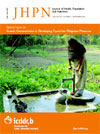
|
The Journal of Health, Population and Nutrition
icddr,b
ISSN: 1606-0997
EISSN: 1606-0997
Vol. 28, No. 4, 2010, pp. 392-398
|
 Bioline Code: hn10051
Bioline Code: hn10051
Full paper language: English
Document type: Research Article
Document available free of charge
|
|
|
The Journal of Health, Population and Nutrition, Vol. 28, No. 4, 2010, pp. 392-398
| en |
Childhood injuries in Pakistan: Results from two communities
Lasi, Seema; Rafique, Ghazala & Peermohamed, Habib
Abstract
The study aimed at determining the incidence, nature, and extent of childhood injuries in two suburban and rural communities of Pakistan. The findings of the study are based on a cross-sectional survey of 2,292 children aged 1-8 years. Information was sought retrospectively from the primary caregiver on the occur-rence of injury that required formal or informal medical consultation during the past three months. The incidence rate of non-fatal injuries that required care outside home for children aged 1-8 years was 19.7 in-juries per 100 person (child)-years of exposure [95% confidence interval (CI) 16.41-23.51]: 26.5 injuries per 100 person (child)-years of exposure (95% CI 21.31-32.63) in the suburban area and 12.1 injuries per 100 person (child)-years of exposure (95% CI 8.68-16.66) in the rural area. The most common non-fatal injuries were falls (10.5 fall injuries per 100 person (child)-years of exposure), burns and scalds (3.5 burn injuries per 100 person (child)-years of exposure), and road traffic injuries (RTIs) (2 RTIs per 100 person (child)-years of exposure). One fatality due to drowning was also reported during the study period. The difference among sex was highly significant (p=0.03). Boys (60%) were at a higher risk of injuries compared to girls (40%). The data also revealed that 61% of the injuries took place inside the home. The magnitude of childhood injuries in the two communities was significant compared to the findings of the National Health Survey of Pakistan (1990-1994). The fact that the majority (61%) of the injuries occurred inside the home raises many questions in relation to the household hazards and adequacy of safety and child-proofing measures in these households. There is a need to develop community-based interventions, creating awareness about the consequences of childhood injuries and educating families about preventive measures to reduce the incidence of injuries during early and middle childhood.
Keywords
Child; Cross-sectional studies; Injuries; Retrospective studies; Pakistan
|
| |
© Copyright 2010 Journal of Health Population and Nutrition.
Alternative site location: http://www.jhpn.net
|
|
